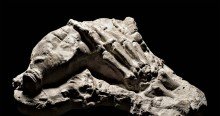We are are currently living in the Anthropocene period in which the human race has been the dominant influence on both the climate and the environment. This, in the eyes of the human race, is seen as a significant part of Earth’s history as we have built sky scrapers higher then we could ever of dreamed off, mechanisms that have enabled us to fly and devices that connect us with people all over the world.
However, looking at our short period of time on this planet we are becoming more deadly then the asteroid/comet that created the Chicxulub crater, that which wiped out the dinosaurs. Scientists have discovered that the average trend of evolution and extinction takes place over a very long time frame.
According to their discoveries we are meant to only experience 1 extinction per mammal over the course of 700 years and we are meant to witness the death of 1 amphibian every 1000 years. However, current studies show that mammals are becoming extinct over 1,000 times faster, with amphibians over 45,000 times faster than their normal rate. We have also lost over 45% of our invertebrates which take up 97% of known species on this planet. This is due to over hunting in which we destroyed species such as the Woolly Mammoth and the Dodo. This is also due to our increased impact on climate change through industrialisation, over population and our constant destruction of natural habitats.
We are also careless with our handling of species such as the Brown Tree Snake, that hitched rides on planes and has caused Guam to lose all of its native birds. The Grey Squirrel that was introduced to England from North America for the first time in 1876 and then on around 30 separate occasions up until 1930, where it was made illegal after studies had found it was heavily impacting the population of Red Squirrels. We are now at a current population of 120,000 Red Squirrels in the UK when we were once, before the Grey Squirrel’s introduction, at a record high 3.5 million. However, the population hasn’t only fallen due to the introduction of Grey Squirrels, although it is the main reason, but also as a consequence of loss of habitat and the changing environment.
All this seems quite scary and rightfully so. As predicted for the next 100 years we will lose 1/3 of all sea species. So how can we stop this? Well first of all we need to become more sustainable. Dr. Wilkie Smits in ‘How to Restore a Rainforest’ talk for TED explains how it is possible to recreate weather patterns by the reforestation of an area. This enables the rebirth of habitats for specific species and over time will see a dramatic increase in their population size if we can reinforce this on a global scale. Most importantly we need too have strong sanctions in place for deforestation, while also helping to provide support for those in poverty around the area who look for ways of generating a healthy income. We need to put pressure on our governments to criminalise poaching and also have methods in order to deter people from killing as a sport.
Pressure also needs to be put in place to rapidly speed up the change from fossil fuels to renewable energy but most importantly see this mass extinction as something we feel passionate about and help to do our upmost to prevent the inevitable outcome we face if we continue to do nothing. Extinction is natural but the speed in which it is taking place is not. The human race’s role must not be to be something that wiped out more life on this planet then the asteroid that made dinosaurs extinct.
Sam Cridland












